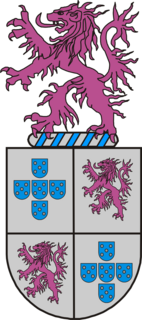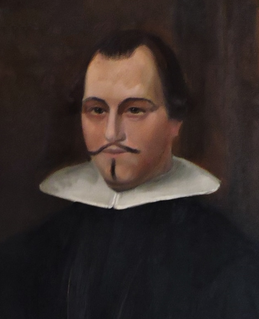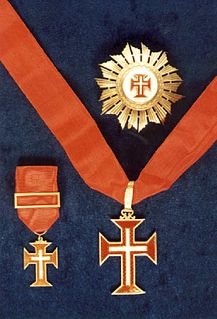Viscount of São Jorge (Portuguese : Visconde de São Jorge) is a title was created by Carlos I of Portugal, by decree dated 7 November 1893, in the name of Adriano Auguto d´Oliveira, Knight of the Royal Household, Knight Commander of the Royal Military Order of Our Lady of Conception of Vila Viçosa. Adriano Auguto d´Oliveira married Eleanor Justine du Puy de Montbrun, daughter of the Marquess Lucien de Montbrun and the Marchioness Louise Amelie Marie Soulages de Saint-Marc. He lived in Paris and died in the same city without surviving descendants.
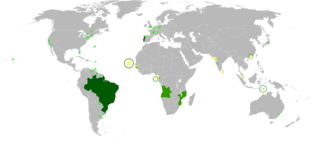
Portuguese is a Western Romance language originating in the Iberian Peninsula. It is the sole official language of Portugal, Brazil, Cape Verde, Guinea-Bissau, Mozambique, Angola, and São Tomé and Príncipe. It also has co-official language status in East Timor, Equatorial Guinea and Macau in China. As the result of expansion during colonial times, a cultural presence of Portuguese and Portuguese creole speakers are also found in Goa, Daman and Diu in India; in Batticaloa on the east coast of Sri Lanka; in the Indonesian island of Flores; in the Malacca state of Malaysia; and the ABC islands in the Caribbean where Papiamento is spoken, while Cape Verdean Creole is the most widely spoken Portuguese-based Creole. Reintegrationists maintain that Galician is not a separate language, but a dialect of Portuguese. A Portuguese-speaking person or nation is referred to as "Lusophone" (Lusófono).

Dom Carlos I known as the Diplomat ; Portuguese: o Diplomata and Portuguese: o Martirizado; 28 September 1863 – 1 February 1908) was the King of Portugal. He was the first Portuguese king to die a violent death since Sebastian in 1578.

Paris is the capital and most populous city of France, with an area of 105 square kilometres and an official estimated population of 2,140,526 residents as of 1 January 2019. Since the 17th century, Paris has been one of Europe's major centres of finance, diplomacy, commerce, fashion, science, and the arts.
The title is associated with the noble house and estate of São Jorge situated in the Trás-os-Montes municipality of Azinhoso. It belonged in the 18th century (around 1740) to Tómas de Sá Pimentel Moraes Pinto d´Oliveira and his wife, D. Luiza Francisca de Moraes e Távora (from the Counts of São João da Pesqueira and later Marquesses of Távora), daughter of António Osório Pinto d´Oliveira de Moraes, Knight of the Royal Household. [1]
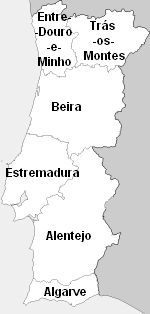
Trás-os-Montes Province is one of the medieval provinces of Portugal.

Azinhoso is a Portuguese freguesia in the Concelho of Mogadouro. The population in 2011 was 307, in an area of 30.80 km². It was parish and capital of Concelho between 1386 and the beginning of the 19th century. In 1801 it had 302 inhabitants.




